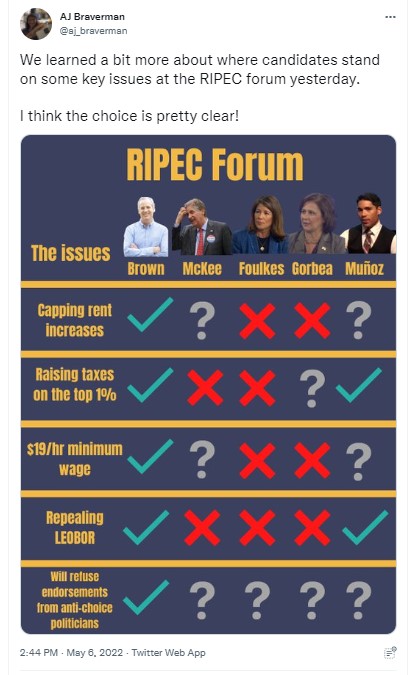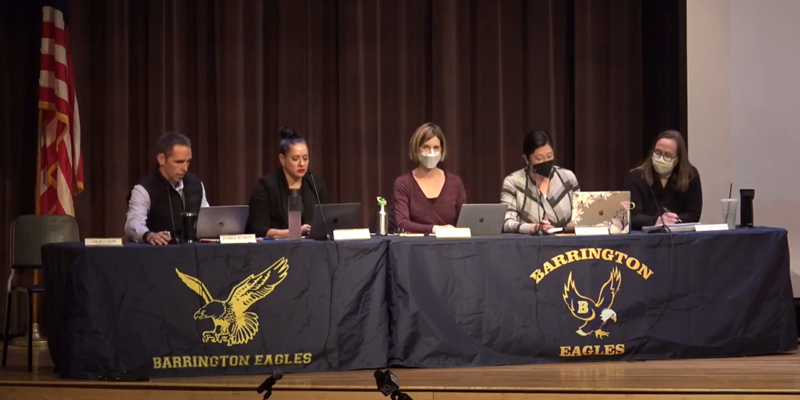A tweet from an apparent Matt Brown supporter shines an unmistakable light on two realities of progressive politics:

Matt Brown, a wealthy man, himself, is precisely the sort of politician observers warned us about at the founding of our country, a huckster willing to capitalize on the ability of people to vote themselves other people’s money in a democracy. He gives no hint that he sees government as a shared institution to help us resolve our disputes peacefully and balance our interests. To Brown and his fellow progressives, the purpose of government is to use its authority to tax and imprison in order to take money from some people and give it to supporters. The policies on which he receives a nice green check all cater to narrow special interests; he would be the archetypal us-versus-them governor, and we should expect Rhode Island’s decline to accelerate.
Even apart from the ideological warfare, though, how cavalier about (or ignorant of) consequences must one be to support such a platform?
- Capping rent increases ignores the underlying causes of increased costs, ensuring greater shortages of housing and more upward pressure on rents.
- The tax-the-rich attitude will lead to less investment in our state, both in a business sense and in a civic sense.
- Forcing up the minimum wage will increase prices, reduce employment, and put businesses out of business.
- While LEOBOR definitely needs reform, the Left’s “defund the police” movement would increase crime and instability.
- And making Rhode Island an abortion hub would kill children, reduce respect for life generally, and contribute to our baby shortage.
That isn’t to say there aren’t arguments to be made across their platform, but modern progressives support lunacy. That was tolerable when they were mainly a performative minority, but as they take office, they are doing real harm, and we should worry that our state’s lethargy and the enthusiasm of those bought off by the handouts will make it difficult or impossible to stop the excesses.
Featured image from Charles Dickens’s Oliver Twist from the British Library.
[Open full post]Alexa Gagosz’s recent article promoting subsidized abortion in the Boston Globe ought to be shocking in its superficiality. Gagosz incorporates zero moral complexity and glosses over the biology of abortions. The article presents the reader with a medical procedure that disadvantaged women can sometimes not manage to afford or procure for reasons of transportation. Activists are given the full article to give voice to any unsubstantiated worry about any policy that might not make abortion as free and casual as it can possibly be.
The article, itself, mentions in passing that Rhode Island is (to our shame) likely to become a destination state for women seeking abortions. Yet, even this, is insufficient for the Boston Globe, which gives the article the headline, “The barriers to getting an abortion in Rhode Island.”
Something sinister and sick oozes out from between the words in such advocacy, and an ethical society would insist that the gaps be filled with moral consideration. This shouldn’t be difficult; look at the first paragraph:
Dr. Beth Cronin had a patient come into her practice recently with an unplanned pregnancy. The couple already had children, and were not in any financial position to have another, but could not afford to pay for an abortion, which can cost hundreds or even thousands of dollars.
Let’s enter at the level of language. Observe that the patient (not a “woman”) enters the practice “with an unplanned pregnancy” — as if pregnancy is some thing separate from the body, some potentially malign thing that somehow attaches to a woman as she goes about her life. The patient wishes to “pay for an abortion,” as if it, too, is some thing — like a simple transaction conducted at any store. You go up to the counter, and you pay for the thing, and you leave. The language is conspicuously distant from the reality of its content.
Turning to the substance, what is going on in the anecdote, objectively put?
A fertile couple has conceived another child whom they’ve decided they cannot afford. What “afford” means can differ from family to family. Are both parents already working full schedules? Are they fully engaging their extended family for support? Do they vacation? Smoke? Go out for dinner often? These are all decisions that ought to be left to families and individuals to make, but in this case, they are relevant because, first, we’re talking about ending a human life and, second, the policy for which Gagosz’s article advocates would require others to pay for the procedure in multiple ways. Those others — whose money is the financial expression of the value of their own labor — have a right to know whether they’re saving the family from bankruptcy and dissolution or just from having to work full schedules or to skip a vacation in any year that a pregnancy attaches itself to mom.
So, having decided that they cannot afford to provide their other children with the joy of an additional sibling, the parents in the anecdote are choosing to kill him or her. That sentence only seems contentious because the abortion debate is so mired in obfuscation. Biologically, the infamous “clump of cells” is an independent human organism who will develop into a baby, be born, and grow up to live a fully human life unless nature, an abortionist, a murderer, or some tragic accident interferes. This is simple biology.
From that point, we can debate existential questions about when a “person” exists with access to rights (the right to life at a minimum), about the obligation parents have to the human beings whom they create (especially when the action to create them was entirely knowing and willful), and about the obligations the rest of us have to those parents and children (as well as the economic system that best fulfills our obligations). These are some of the most challenging ethical questions of the human experience. Apparently, Gagosz and the doctors whom she quotes have an attenuated sense of the interplay of biology and ethics.
Finally, we come to the target of their advocacy. Even if the moral conclusion of Gagosz and the abortionists is justified, one can hardly miss the fact that many people disagree. Indeed, this moral question is one of the major stories of the past fifty years, at least, in our country. Let alone failing to live up to the promise of modern journalism, such articles do an active disservice to readers by excluding the very core of the controversy.
In this, Gagosz is precisely in line with what mainstream journalism has become, and the consequence shows in younger generations. In story after story, the reason for the protagonists’ circumstances is minimized or excluded entirely, leaving no explanation but that a wicked patriarchy is oppressing others simply for oppression’s sake.
How does a celebrity host of a political/social talk show like Bill Maher reach his mid-sixties not knowing that the United States’ abortion law is among the most radical on the planet? Because he has wrongly believed that his news sources inform him about the world. If they ever did, they don’t any longer. They convey the particular beliefs of a particular class and a particular ideology to further the power of a particular political party.
Featured image by Dev Asangbam on Unsplash.
[Open full post]On WNRI 1380 AM/95.1 FM, John DePetro and Justin Katz discuss:
- The gubernatorial candidates battle for least noteworthy
- Progressives try to make lemonade from SCOTUS lemons
Featured image by Jullliia on Unsplash.
[Open full post]The news comes from the beginning of the digestive process…
The out-of-stock rate for baby formula hovered between 2% and 8% in the first half of 2021, but began rising sharply last July. Between November 2021 and early April 2022, the out-of-stock rate jumped to 31%, data from Datasembly showed.
To the end…
Sky-high prices for industrial fertilizer are projected to reduce American farmers’ corn and wheat plantings this spring, according to U.S. government data. That further threatens global food supplies as domestic wheat inventories are the lowest in 14 years, and the Russia-Ukraine war is disrupting grain shipments from those key suppliers.
Meanwhile, Hans Bader notes the downslide of the stock market, with the economy underperforming.
One can observe the effects in daily life. My daughter and I stopped by our bank branch the other day, and it was unexpectedly closed. Another surprised customer observed that a teller had recently mentioned the bank’s trouble finding workers.
Meanwhile, thanks to the premature death of our septic system, we’ve been undergoing the massive, expensive project of replacing it. Not only are all the materials ridiculously expensive, but every contractor involved in the project has complained about the inability to find workers, and the knock-on consequences of that problem have shown. I can attest to the fact that the workers they can find may not be bringing the best work ethic to the job.
Any trend this pervasive will be subject to interpretation (if we want to put it positively) or distortion and muddied water (if we want to be a little cynical), but it seems to me that these are the fruits of progressivism (aka socialism). In the fantasy world of the people running our country, products get made and work gets done… simply because. In their minds, one need never consider human nature or the incentives their policies create.
Such folks won’t listen, of course, but it’s worth pointing out that the world doesn’t work that way. Vilify productive people and buy the votes of the unproductive with promises of magical taxpayer debt, and the message will get out.
Too late will people realize that they should have worked a decent job when they had the chance, because it was better than sorting through trash for a meal.
Featured image by Hermes Rivera on Unsplash.
[Open full post]Speaker Shekarchi on Current Legislative Matters (4/11/22) from John Carlevale on Vimeo.
Speaker of the House of Representatives Joseph Shekarchi speaks with Richard August, candidly and straightforwardly discussing some of the current matters facing the legislature. Topics include recreational marijuana, the size of the budget, voting rules, policeman’s bill of rights, access to the shoreline, gun laws, driver’s permits for undocumented persons, elimination of voter ID, legalization of prostitution, and bonus payments to state employees.
[Open full post]For the growing “our elites are insane” file, WPRI gives this propagandistic headline to an AP article: “Early transgender identity tends to endure, study suggests.” See, the editor is implying, it’s not just a faddish thing that fades quickly. But think objectively about what precisely the study found:
The research involved 317 youngsters who were 3 to 12 years old when they were recruited to the study. Five years later, at the study’s end, 94% were living as transgender and almost two-thirds were using either puberty-blocking medication or sex hormones to medically transition.
Most children in the study were from white, high-income families who supported their transitions. On average, the kids began identifying as transgender at around age 6.
To be exact, 77% of study participants were white (68% non-Hispanic and 9% Hispanic), and 66% had household income over $75,000. The study doesn’t provide the actual data on other demographics, only noting that the parents were disproportionately college graduates, and it doesn’t give details about whether these demographics correlated with results. The average age at which the children had their “first transition” was 6.5, and only 22% were fourteen years old or older by the end.
On average, we can characterize the study as having found that six-year-olds — first graders — whose relatively wealthy white parents encourage them to see themselves as inhabiting the wrongly sexed body (or at least do not discourage the idea), taking action to reinforce that belief to the extent of entering them in a professional study, don’t push back or decide that they’ve been placed on the wrong path before they get to middle school.
This isn’t a sign that the children and their parents correctly identified their genders. It’s an indication of societal child abuse.
What’s more, with the academics and the news media so inclined to be boosters for this ideology, we can have no trust that they will ever deliberately find, release, or report evidence of harm it may be causing to children, teens, and adults. Consequently, we’re setting these kids — and our entire civilization — up for an irrevocable and tragic outcome.
Featured image by Caleb Woods on Unsplash.
[Open full post]With a bit of spectacularly bad timing for Rhode Island insiders (who may very well win anyway), an employee of the state Department of Labor and Training has been charged with stealing funds from exactly an area that labor unions are trying to make more flush:
An employee of the Rhode Island Department of Labor and Training is accused of stealing $115,000 in settlement checks.
Rhode Island State Police said Wendy Antonelli of Foster faces charges of obtaining money under false pretenses, forgery, counterfeiting and money laundering. …
“In her capacity as Chief Labor Standards Examiner, Ms. Antonelli was responsible for overseeing employee misclassification investigations and distribution of misclassification settlement checks intended for employees of the businesses investigated. An employee is misclassified when their employer incorrectly deems the employee as an independent contractor,” state police said in a release.
“Misclassification” is what labor unions misleading call “wage theft.” They imply that employers are stealing from their employees, but it can be — and may often be — simply the case that the employer and worker have agreed to have an independent contractor relationship. I’ve certainly known both carpenters and office workers who’ve preferred that arrangement.
But the more unions can restrict the ability of employers and workers to come to mutually beneficial arrangements on their own — and the more they can be made to distrust each other — the more likely unions will be able to insert themselves into the deal and take a cut that otherwise would have been divided between the parties. Politicians and bureaucrats (most of them active union members, themselves) are happy to facilitate this third-party intervention.
According to the state police, we here have a state employee (who makes $87,000 per year) taking the money that employers have paid to settle these claims for herself. One only stretches slightly to suggest that this action is only a more-direct redistribution than the unions are seeking by lobbying for stronger laws.
Obviously, we shouldn’t take this example as representative, but the lessons are broader. The unions’ rhetoric suggests that Rhode Islanders can’t trust their employers, so government must step in to take their side. Well, we obviously can’t trust state government, either.
Maybe we should start trusting ourselves to live as professionals and adults.
Featured image by Devin Kaselnak on Unsplash.
[Open full post]This, from Mark Tapscott in The Epoch Times seems like exactly the sort of thing we’d be hearing a lot about if those tasked with promulgating and debating information were truly committed to the American project of freedom and experimentation:
There were 78.3 million employed individuals in the [right-to-work (RTW)] states in February 2020, when the economic impact of the virus that’s also known as novel coronavirus, first began to be felt across the nation.
As of March, the total number of employed individuals in the 27 states had climbed to 79.2 million, an increase of 1.2 percent, according to an analysis that was made available to The Epoch Times by National Right to Work Committee (NRTWC) researcher Stanley Greer.
By contrast, in the non-RTW states, in February 2020, there was a total of just more than 80 million employed individuals; but by March, that total fell to 78.6 million, for a decline of 1.75 percent (figures are rounded for reporting purposes).
Many variations exist, of course, but there are basically two models on offer to the American people. One emphasizes centralized control through a political process, while the other emphasizes a system of cooperative freedom that decentralizes control and deliberately incorporates decision-making outside of the political process.
The first distrusts people to act independently in the management of their lives and, in an organic way, society while the second distrusts people to act hierarchically in the management of other people’s lives and society in a deliberate way. The better choice is, in my view, obviously the second approach.
I could be wrong, however, which makes this question a perfect — perhaps defining — case to run through the laboratory of competitive states. Unfortunately, albeit predictably, the system that seems likely to win that competition is not the system favored by people who control information and government.
Featured image by Adeolu Eletu on Unsplash.
[Open full post]As Anchor Rising readers know, last week a Providence Journal headline proclaimed, “RI’s record-shattering baby shortage could spell trouble for state’s economy.” This week, Lieutenant Governor Sabina Matos proclaimed her aspiration for the Ocean State to kill more:
I’m confident RI can become a national leader for reproductive rights at a time when these rights are coming under attack. We can not go back.
I can understand the reasoning of the pro-abortion side and the complexity of the moral issues should one acknowledge the life of the baby. We must also be compassionate about the implications for women who have had abortions as science and law clarify exactly what abortion is.
Still, the rhetoric we’re hearing from Matos and others reveals fanaticism in the face of reality and an unwillingness to grapple with complexity.
Another glimmer of this madness appears in the legislation (H7442 and S2549) that would force taxpayers to fund abortions for state employees and people who receive subsidized healthcare. That policy shift would be bad enough on its own, but the legislation takes the additional step of disappearing the word “women” as the category of “persons” who can actually become pregnant.
Not long ago, this would have been recognized — indeed, lampooned — as the anti-scientific madness that it is. Yet in Rhode Island, we’re letting these people control our government and news organs.
Matos’s notion that “we cannot go back” is being proclaimed up and down the political hierarchy, but it’s yet another example of the delusion. Backwards is exactly where these radicals are taking us, and we’re not going to like the society that they impose on us. Although, they will naturally leverage their propagandistic power to find others to blame.
Featured image by Dawid Zawila on Unsplash.
[Open full post]









